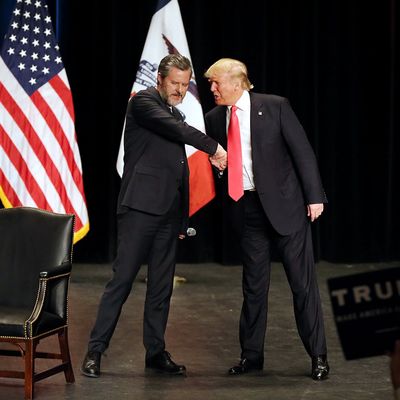
Before the 2016 elections, amidst evidence of some stress in conservative evangelical leadership circles over the religious implications of the community’s strong support for Donald Trump, the possibility that this could represent the Last Hurrah of the Christian Right as we have known it was a pretty lively topic of discussion. Personally, after years of challenging the wishful-thinking premise of secular folk and religious progressives alike that the Christian Right was on the decline, I argued in October that the spiritual gymnastics associated with supporting Trump might stretch the alliance of religious and nonreligious conservatives to the breaking point:
The intergenerational tensions among conservative Evangelicals likely won’t matter at all on November 8. But down the road, the experience of sacrificing their integrity for a failed presidential campaign may have an impact on Christian conservative leaders who haven’t already traded their birthright of independence for a mess of Republican Party pottage.
Quite obviously Trump’s presidential campaign was not in fact “failed,” and that simple fact will probably provide a second wind — if not a new lease on life — for the old-guard Christian Right leadership that backed him and helped deliver an extraordinary percentage (81 percent of white evangelicals) of their flocks.
The big question for those triumphant Trumpites of the Cloth will be whether and how quickly he delivers on his big promises to this particular constituency.
For conservative evangelical clergy, the shiny bauble held out by Trump that they most value is probably repeal of the Johnson Amendment that prevents outright ex officio electioneering by leaders of tax-exempt nonprofit organizations. That will require a statute. But the fact that this involves the Internal Revenue Service will probably be enough to justify nestling the provision into one of the budget reconciliation bills congressional Republicans will probably seek to pass next year, making it both relatively inconspicuous and filibuster-proof. If Republicans fail to do this, it will be noticed with dismay by its intended beneficiaries.
The bigger item probably most valued by politically active conservative evangelical laypeople is a reliable vote on the Supreme Court to overturn Roe v. Wade and if possible Obergefell v. Hodges (the decision that legalized same-sex marriage) — though the latter is probably a stretch —while also strengthening “religious liberty” protections for conservative Christians who don’t want to contaminate themselves with same-sex marriage rites or access to contraceptives by women. Thanks to the current vacancy on the Court, this is one promise Trump will be expected to keep almost immediately, and if he double-crosses the Christian Right with a nominee that is less than 100 percent certain on these issues, its Senate allies could credibly threaten to prevent confirmation.
Elsewhere, Islamophobia ranks up there with homophobia as a conservative evangelical itch Trump is adept at scratching, so continued suggestions that American foreign policy is being reorganized to pivot toward War with Radical Islam will be popular in those precincts. If Trump and his foreign-policy folk issue regular shout-outs to the interests of Middle Eastern Christians (a convenient rationale for tilting toward Putin and Assad), that’s all the better.
Like other conservative white people, white conservative evangelicals will for the most part be happy with more conventionally reactionary Trump moves toward repealing Obamacare, cutting taxes, boosting defense spending, and hammering safety-net programs from which they do not themselves benefit. Aside from repeal of the Johnson Amendment, fully defunding Planned Parenthood will be a must-pass budget item for the Christian Right. And they will be very avid for Trump to back Education secretary Betsy DeVos (assuming she is confirmed) to the hilt as she tries to convert federal education funding into a lever for convincing states to move public-school dollars into private-school vouchers.
All in all, 2017 looks like it will be a happy, fulfilling year for the culture warriors of the Christian Right, but there are some potential stumbling blocks in the path of a renewed “marriage of convenience” with the GOP. Evangelical leaders are divided over immigration policy, which is likely to be a hot-button issue after the inauguration, as it was during the campaign. And any fresh incidents of Trumpian crudeness and overt hostility to Christian values could serve as an irritant as well. You can expect Mike Pence to serve as a soothing ambassador to this constituency if the Boss gets all heathenish again.
But the long-term tensions between the religious and political interests of conservative evangelicals, and their tendency to conflate those interests, have hardly been dispelled by an election victory. Certainly Southern Baptist spokesman Russell Moore, a highly visible dissenter against the support for Trump his co-religionists offered, has not changed his mind about the underlying issues, as he made clear in a statement immediately after the election:
The most important lesson we should learn is that the church must stand against the way politics has become a religion, and religion has become politics. We can hear this idolatrous pull even in the apocalyptic language used by many in this election—as we have seen in every election in recent years—that this election is our “last chance.” And we can hear it in those who assume that the sort of global upending we see happening in the world—in Europe, in the Middle East, and now in the United States—mean a cataclysm before which we should panic.
If in the next few years the Christian Right turns out to be “losers,” as Trump would put it — either losing in elections and policy fights, or by losing their own professed convictions — the crisis people like Moore sensed when the Trump candidacy slouched towards Bethlehem to be born could return in a big-league way.






























